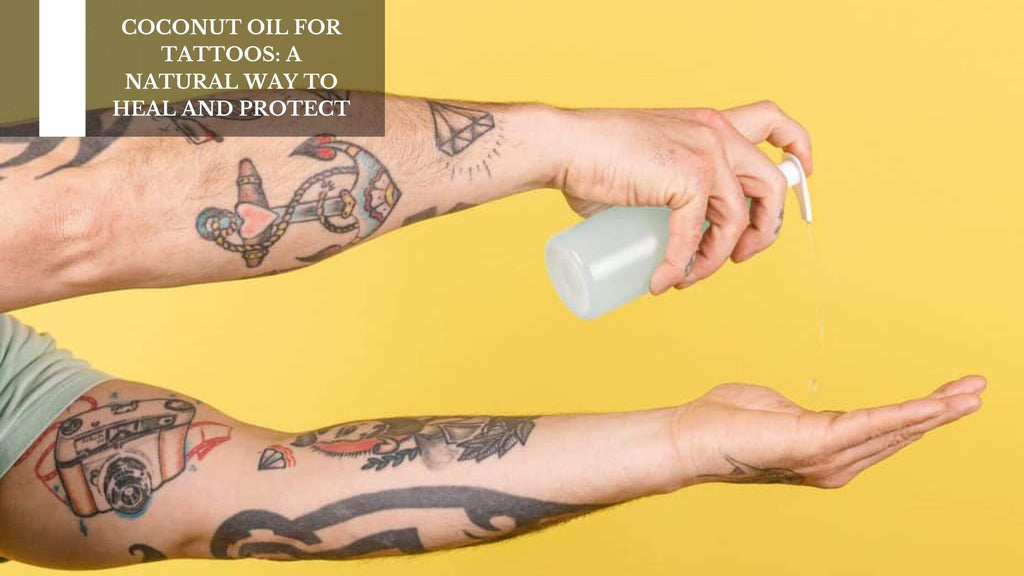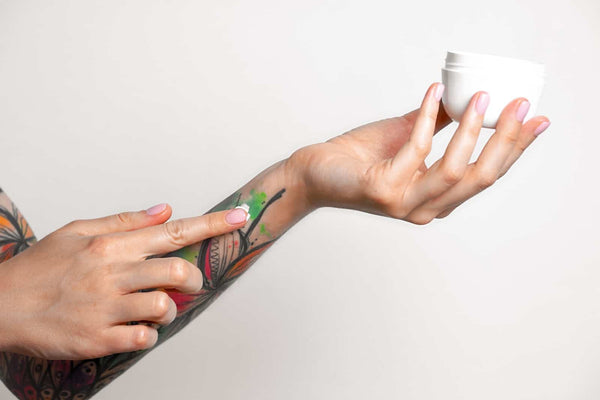Coconut Oil For Tattoos: A Natural Way To Heal and Protect

Coconut oil is an organic compound in which the first unbranched and saturated fatty acids are called lauric acid. It's solid at room temperature but liquefies or melts with the application of heat. Made up mostly of saturated fatty acids ("saturated fat" means that it only has single bonds between carbons) and medium-chain triglycerides (MCT), coconut oil produces a mild effect. That's why many people use it as a health supplement for their skin, hair, and body because it is beneficial to all these areas without any adverse side effects.
You may also like:
Simple example of coconut oil benefits, Coconut oil is composed mostly of saturated fatty acids (stearic acid or "C18:0") and medium-chain triglycerides (known in the industry as "caprylic acid" or a "C7"). Because it has only one double bond between carbons, it's a saturated fatty acid. Since their atoms have no odd electrons, they're not very reactive. So, coconut oil does not go rancid easily. Put another way, the unsaturated fatty acids in olive oil spoil easily due to chemical reactions.
Benefits of using coconut oil for tattoos:
1) For freshly inked tattoos
It will prevent the tattoo ink from drying, cracking, and bleeding. It will also keep the skin smooth and soft. Tropical coconut oil is antibacterial, antifungal, and antiviral. It may help prevent post-tattoo infections like bacterial infections, tattoo rash, fungal infections, wound infections, etc. Use the oil every day after your tattoo is healed. This will prevent the tattoo from being exposed to air and additional bacteria, thus preventing additional infection.
2) For long-lasting tattoos
You can use coconut oil for a few weeks after your tattoo heals but do not use coconut oil for more than three months. Keep in mind that this is a short-term treatment. It's best not to use it for more than three months because if you do, it will turn into solid at room temperature and then won't liquefy again when heated. Within a week or two of applying the oil to your tattoo, your skin will begin to produce a new layer of skin cells that help provide a protective layer against bacteria and microbes.
3) For protection against infection
The skin and the oils of coconut oil have powerful antibacterial, antifungal, and antiviral properties. They can help protect you against infections. Coconut Oil for tattoos also helps you to avoid using harsh chemicals or drugstore creams, which means no side effects from damaged skin cells from chemicals, thus a great way to help you maintain that original look of your tattoo.
4) For moisturizing and softening the skin
The fats in coconut oil can also soothe your skin faster and protect against irritation after a tattoo session. Coconut oil is nature's perfect lotion, which means it comes without any additives or preservatives that can irritate sensitive skin. If your skin is on the dry side, applying coconut oil for tattoos will help you keep it moisturized. Coconut oil also makes your skin smoother and softer.
5) For cosmetic reasons
Many people use coconut oil for their anti-aging needs because the fats in the oil are important for many body processes that maintain youthful and beautiful skin.
6) For best color results
If your tattoo artist uses machine methods, such as a gun or electric needle, then the right type of machine that they use is very important to preserve the clarity of the colors of your tattoo for as long as possible. Some machines can heat up to 400 degrees Fahrenheit (200 degrees Celsius), which is too hot for keeping a color bright as it fades with time. It's best to use coconut oil for this type of tattoo.
7) For better healing results
Many physicians have realized that applying coconut oil to a wound helps heal faster. Coconut oil also has a positive effect on the condition of your immune system, which can help prevent infections that may arise because of an open wound.
8) For brighter colors
There are other uses for coconut oil that aren't directly tattoo-related but will still help you keep your tattoo looking fresh. If you want your colors to look brighter and more saturated, use coconut oil after you get home from the parlor and it will create a barrier between your skin and everything else that might damage or discolor your tattoos. This is especially useful if you have sensitive skin or break out easily.
9) For aftercare of sensitive skin
There's another reason to use coconut oil for your tattoos, and that is if you have very sensitive skin. Tattooing needles can sometimes break or scratch the skin, especially if you have thin layers of epidermal tissue. Although this isn't a common occurrence, it does happen from time to time. If you expose yourself to natural sunlight often (like working outdoors), then it will damage your tattoo faster than others as well as any other part of your body exposed to sunlight. Some people are just more susceptible to sunburns than others, due to the melanin in their skin.
10) Protection against sunlight
Because of the way our bodies trap inactive cells, the waste products and toxins are stored in so-called "storage compartments" (which are lymph glands), we can react differently to ultraviolet light depending on which of those cells is most active at any given time. This means that your skin reacts differently to UV exposure depending on whether it has enzymes in a state of "keep-alive." Some people with darker skin have this problem more often than others, but everyone can benefit from using coconut oil for tattoos because it has a protective effect against sunlight.
How to use organic coconut oil for tattoos?

Step 1: To keep your tattoo ink from drying, cracking, and bleeding, you can use coconut oil to help protect it.
Step 2: Apply coconut oil for tattoos to your freshly inked tattoo as soon as possible after leaving the parlor (especially if you have a lot of colors). Leave the oil on for at least 6 hours or more.
Step 3: The next day, use coconut oil every day until your tattoo is all healed. Use the oil while it's still fresh and moisturise your skin before you go out in the sun.
Step 4: After that, when your tattoo starts fading, apply it again to help new skin cells grow that will heal and protect your skin from infections.
Step 5: The use of coconut oil for tattoos is optional, but it's best to use it for at least three months after your tattoo heals.
Step 6: After you've used coconut oil for a while, you can decrease the amount of times you apply it. Keep using it now and then.
You may aslo like:
If you want to boost the ink retention of your tattoo, use organic coconut oil with a bit of vitamin E to moisturize and soothe the skin while keeping excess moisture away from the skin to avoid irritation and redness. Then keep using this as part of your daily routine until the tattoo is fully healed. Use a few drops on a cotton swab or ball and apply directly to your tattoos before bedtime.


Leave a comment